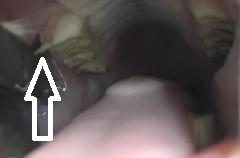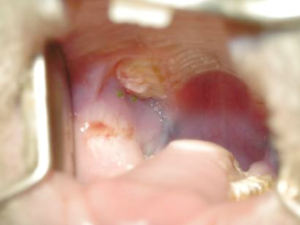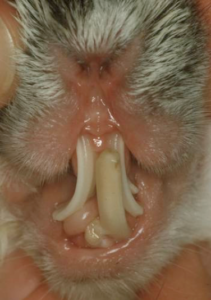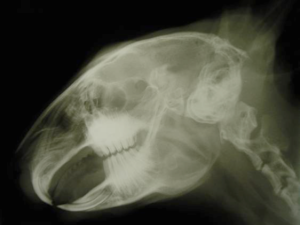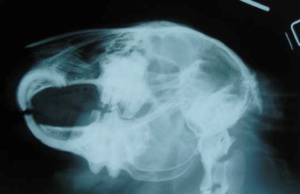Rabbits teeth grow continuously throughout their lives. They have incisor teeth at the front for snipping grass, and cheek teeth ‘at the back’ for chewing and grinding. The teeth need to meet properly to work, if they don’t (malocclusion) regular veterinary dental treatments are required. If the molar teeth aren’t worn down evenly, they can develop sharp points that can cut into the rabbit’s mouth and tongue.
Dental disease in rabbits is usually caused by an improper diet and a lack of abrasive foods e.g. hay/grass, causing the teeth to become overgrown. Sadly, it is a common problem, and can rapidly become serious if the rabbit is unable to eat. Unfortunately, once rabbits have developed dental disease it is not possible to cure the problem, even if the diet improves, and often they require regular vet visits and treatment (as often as every 4-6 weeks for overgrown incisors, and every 10-12 weeks for cheek teeth treatment).
High fibre in the diet is essential for rabbits. Good quality hay and/or grass should make up the vast majority of a rabbit’s diet (about 85% of what your rabbit eats) and should be available all the time. This can really help to reduce dental problems, as a rabbit’s teeth must be kept worn by chewing. Another massive bonus is that it keeps the gut functioning properly too.
Rabbits also need to eat washed green leafy vegetables e.g. cabbage, broccoli and kale (about 10-15% of what your rabbit eats). A very small quantity of concentrate food (only 1-2% of what your rabbit eats) can also be offered to your rabbit, but this is best reserved to offer as a treat. Muesli-style rabbit foods are not advisable as the rabbit will selectively eat certain bits resulting in an unhealthy unbalanced diet. Good quality pellet style foods are preferable to muesli mixes. Carrots and apples should only be occasional treats because although your rabbit might love them, they are relatively sweet and sugary (even though it is natural sugars).
If your rabbit ever shows signs of going off their food or has a reduction in the amount, or size, of stool (faeces/droppings) being passed they need to be assessed by a vet quickly. A rabbit that does not eat for as little as 10 hours can be a medical emergency. Other signs of dental disease can include a bumpy feel to the jaw, and runny eyes (due to blocked tear ducts secondary to overgrown or infected tooth ‘roots’).
Treatment
To examine a rabbit’s teeth the vet will often use an instrument called an otoscope to look for sores, sharp edges or signs of discomfort inside the mouth. Typically only ~40% of problems can be seen this way and for more thorough examination, or if dental work is needed, your rabbit will usually require a general anaesthetic for full assessment. It is poor practice to clip a rabbit’s teeth, as the operator has no control of where the tooth will shatter. It can cause splitting and infection and leave sharp edges that further contribute to oral discomfort. We trim the incisors using a special dental tool and have other specific tools for smoothing down any spurs on the molar teeth. Frequently incisors can be trimmed, painlessly, without the need for an anaesthetic.
If you are worried about your rabbit and want to book an appointment give us a call on 01803 606059 (Torquay) or 01803 843836 (Paignton). We are pleased to be able to offer appointments with a rabbit expert, Ian Sayers, in our exotic pet clinic.

